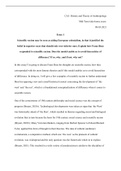CA3: History and Theory of Anthropology
Mid-Term take-home exam
08-03-2021
Essay 1
Scientific racism may be seen as aiding European colonialism, in that it justified the
belief in superior races that should rule over inferior ones. Explain how Franz Boas
responded to scientific racism. Does his model enable us to avoid hierarchies of
difference? If so, why, and if not, why not?
In this essay I’m going to discuss Franz Boas his thoughts on scientific racism, how they
corresponded with his most famous theories and if this model enables us to avoid hierarchies
of difference. In doing so, I will give a few examples of scientific racism to further understand
Boas his opposing view and a small historical context concerning the development of ‘the
west’ and ‘the rest’, which is a foundational conceptualization of difference when it comes to
scientific racism.
One of the cornerstones of 19th century philosophy and social science was the concept of
progress (Bryant, 2021b). Technological developments were taken as signs that ‘the West’
was historically ahead of ‘the Rest’, which resulted in theories regarding social and biological
evolution that in turn became the basis for 19th century social science and scientific racism
(Bryant, 2021b). Many Victorian thinkers, ranging from Herbert Spencer to Edward Burnett
Tylor, applied this form of thought in their theories. The idea of cultural (unilinear)
evolutionism, a comparative method, which saw ‘the west’ as the pinnacle of cultural
evolution, was widespread and the only question was the framework which in to explain
(Bryant, 2021). This resulted in a wide variety of pseudosciences similar to the discipline of
, craniometry; a comparative pseudoscience that measured the size of skulls to subsequently
make predictions about the traits about the people in question (Bryant, 2021).
Franz Boas was convinced that empirical data should form the basis of social theories instead
of armchair theories that reduced reality to schemata (Eriksen & Nielsen, 2013). Greatly
inspired by his time among the Inuit of Canada, Boas proposed that cultures are not innate
(part of ‘race’), but learned (Bryant, 2021b), which in turn proved that racist pseudosciences
like craniometry and phrenology, scientifically speaking, don’t make any sense. Boas his
view, which puts emphasis on the uniqueness of each culture, is clearly formulated in his
theory of historical particularism, which states that the evolution of each society or culture has
to be understood in relation to its own historical and geographical dynamics (Bryant, 2021b).
Boas his conception of culture also led to a reevaluation of the concept of cultural relativism:
idea that every culture must be understood according to its own logic and that it is misleading
to try to arrange cultures on an evolutionary ladder (Bryant, 2021b). A theory that contrasted
the contemporary tendency towards ethnocentrism. Boas invigorated the importance of
‘culture’ in American anthropology through these theories and explicitly excluded race from
anthropology’s purview (Bryant, 2021b).
These theories are one of the main reasons why I would advocate that Boas enabled us to
avoid the hierarchies of difference, because these theories debunk much of the contemporary
theories that try to ‘scientifically’ distill hierarchical superiority and inferiority through
conceptualizations of race and civilization. Boas his model of thought flat out denies and
prevents hierarchical thinking of this sort, because it thoroughly avoids comparative methods,
which are necessary and essential in the discourse concerning hierarchy.
Nevertheless, there are some flaws to be found in Boas his model and thinking. For example
his focus on the theory of diffusion and migration, which proposes that cultural traits develop






